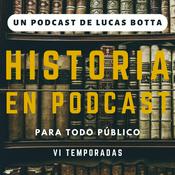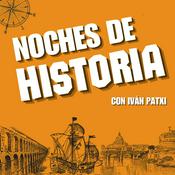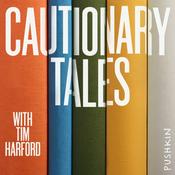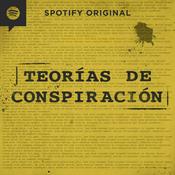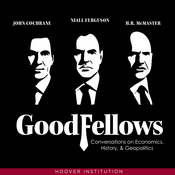117 episodios
Basketball in the Last 60 Seconds: Ben Sasse on Mortality, Meaning, and the Future of America | Peter Robinson | Hoover Institution
17/2/2026 | 59 minIn December 2025, former US Senator Ben Sasse announced that he had been diagnosed with stage 4 pancreatic cancer. That’s the primary topic for this far-reaching conversation about mortality, faith, and what truly matters when time is short. Sasse reflects on “redeeming the time”—holding ambition lightly, loving family more deliberately, and resisting the urge to make politics or professional success the center of life.
The discussion also covers Sasse’s thoughts on the failures of Congress; the dangers of a fragmented, attention-starved republic; the crisis of higher education; and the moral challenges of technological abundance. Sasse speaks candidly and movingly about regret, forgiveness, prayer, and suffering—arguing that while death is a real enemy, it does not get the final word.
Recorded on February 9, 2026.
Subscribe to Uncommon Knowledge at hoover.org/ukThomas Sowell on School Choice and the Price Our Children Pay for Bad Ideas | Peter Robinson | Thomas Sowell | Hoover Institution
27/1/2026 | 1 h 11 minThomas Sowell delivers a sweeping critique of American education, affirmative action, and modern universities, drawing on his own life story—from Harlem classrooms to Ivy League institutions—decades of research, and hard data. Sowell argues that ideology has replaced knowledge and that well-intentioned policies often harm the very people they are meant to help. He explores intersecting issues of race, charter schools, universities, AI, and the future of American institutions—with his usual clarity, candor, and unmistakable intellectual force.
Recorded on September 30, 2025.
Subscribe to Uncommon Knowledge at hoover.org/ukWhy Does 2 + 2 = 4? What Math Teaches Us About Deep Reality | Peter Robinson | Hoover Institution
15/1/2026 | 57 minIs math something humans invent—or something we discover? And why does it describe the universe so uncannily well?
In this episode of Uncommon Knowledge, Peter Robinson sits down with mathematicians David Berlinski, Sergiu Klainerman, and Stephen Meyer to explore one of the deepest mysteries in science and philosophy: the reality of mathematics.
From the simple certainty that 2 + 2 = 4 to the mind-bending mathematics behind black holes and quantum physics, the conversation asks why abstract numbers—created in the human mind—map so perfectly onto the physical world. Is mathematics purely logical, or does it point to a deeper structure of reality that isn’t material at all? Along the way, the panel explores beauty in science, the “unreasonable effectiveness” of math, and whether the concept of materialism can really explain the world we live in.
This wide-ranging discussion blends mathematics, physics, philosophy, and metaphysics into a fascinating conversation about truth, beauty, and the nature of reality itself.
Subscribe to Uncommon Knowledge at hoover.org/ukRussian Soul, American Life: A Conversation with Ignat Solzhenitsyn | Peter Robinson | Hoover Institution
16/12/2025 | 1 h 4 minPianist and conductor Ignat Solzhenitsyn reflects on growing up in exile as the son of Nobel laureate Aleksandr Solzhenitsyn, moving from Soviet persecution to a quiet childhood in rural Vermont. Ignat recounts how music, faith, and Russian culture sustained his family far from home, how cellist and conductor Mstislav Rostropovich helped set him on a musical path, and what it meant to carry a historic name while forging his own life between Russia and America. The conversation ranges from the moral legacy of his father’s The Gulag Archipelago to the emotional power of Russian music, the meaning of freedom, and the enduring truth that the line between good and evil runs through every human heart. It’s a deeply personal conversation on memory, exile, and the choices that shape a life. The episode concludes with Ignat at the piano performing a section from Bach’s Cantata No. 208, Sheep May Safely Graze.
Subscribe to Uncommon Knowledge at hoover.org/ukTeaching Gorbachev Capitalism: Jerome Powell, Condoleezza Rice, and Michael Boskin Discuss George Shultz, the Economist | Peter Robinson | Hoover Institution
05/12/2025 | 1 h 2 minFor the second edition of the George P. Shultz Memorial Lecture Series, Federal Reserve Chair Jerome Powell, Hoover Institution Director Condoleezza Rice, and Hoover Senior Fellow Michael Boskin assemble for a wide-ranging conversation on the economic mind and legacy of George P. Shultz. From his early career as a labor economist at MIT and the University of Chicago to his battles in the White House cabinet over wage and price controls, the closing of the gold window, and inflation that defined the Nixon and Reagan eras, Shultz emerges as a rare figure who fused intellectual rigor with political pragmatism. The panel explores how his beliefs in free markets, personal integrity, and “trust as the coin of the realm” shaped his actions, from collective bargaining and desegregation to global diplomacy—right up to his famous economic tutorials for Mikhail Gorbachev in the Kremlin. This is a timely look at how one man’s economic philosophy helped steer American policy for half a century.
Subscribe to Uncommon Knowledge at hoover.org/uk
Más podcasts de Historia
Podcasts a la moda de Historia
Acerca de Uncommon Knowledge
For more than two decades the Hoover Institution has been producing Uncommon Knowledge with Peter Robinson, a series hosted by Hoover fellow Peter Robinson as an outlet for political leaders, scholars, journalists, and today’s big thinkers to share their views with the world.
Sitio web del podcastEscucha Uncommon Knowledge, El colegio invisible y muchos más podcasts de todo el mundo con la aplicación de radio.net

Descarga la app gratuita: radio.net
- Añadir radios y podcasts a favoritos
- Transmisión por Wi-Fi y Bluetooth
- Carplay & Android Auto compatible
- Muchas otras funciones de la app
Descarga la app gratuita: radio.net
- Añadir radios y podcasts a favoritos
- Transmisión por Wi-Fi y Bluetooth
- Carplay & Android Auto compatible
- Muchas otras funciones de la app


Uncommon Knowledge
Escanea el código,
Descarga la app,
Escucha.
Descarga la app,
Escucha.




